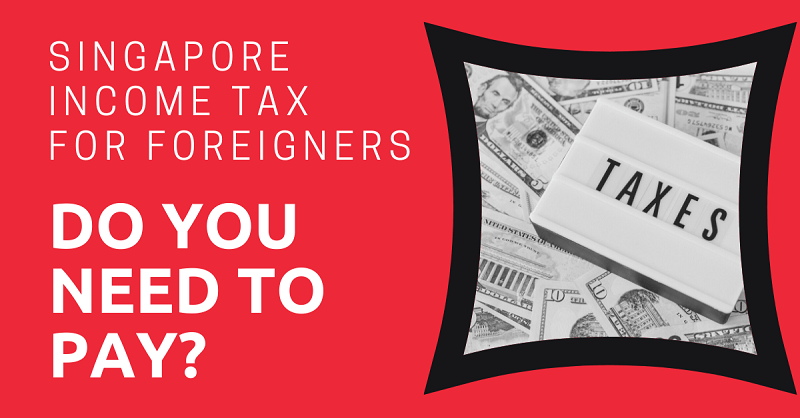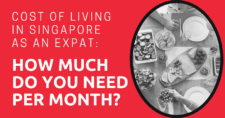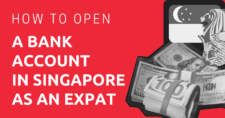
Taxes are never fun to think about or do, but they’re a necessary part of life, even when living abroad. Singapore’s tax system is quite simple, but if you’re a new expat to the country, you may not know what your tax obligations are yet.
To avoid paying hefty fines or being refused exit from the country when you’re ready to leave Singapore, it’s best to learn about these obligations ahead of time.
This guide can help you determine your tax obligations and the rates you may have to pay and teach you how to file your income taxes. The currency used throughout the article is Singapore’s national currency, the Singapore Dollar (SGD).
This article will take approximately 11 minutes to read. Don't have the time right now? No worries. You can email the ad-free version of the article to yourself and read it later!
Disclaimer: This article may include links to products or services offered by ExpatDen’s partners, which give us commissions when you click on them. Although this may influence how they appear in the text, we only recommend solutions that we would use in your situation. Read more in our Advertising Disclosure.
Contents
Key Takeaways
- If you lived and worked in Singapore for more than 183 days in a calendar year, you’re considered a tax resident, which means you need to pay your taxes between March 1 and April 18.
- If your Employment Pass or S Pass is up before then, make sure you pay any taxes due. Otherwise, you won’t be allowed to leave the country.
- Singapore doesn’t withhold taxes, so it’s up to you to put money aside to pay your personal tax on time.
- Singapore has incredibly low tax rates. You don’t even need to pay anything on the first $20,000 you earn.
Do Expats Pay Income Tax in Singapore?
As an expat working in Singapore, you will likely have to pay personal income tax on any income you earn. Thankfully, Singapore’s tax rates are quite low, especially compared to places like Canada, the United States, and Australia, so it attracts many foreigners from these countries.
To determine if you have to pay taxes in Singapore, you first need to find out if you’re considered a tax resident.
Tax Residents vs. Non-Tax Residents
If you’re a Singaporean, a permanent resident, or a foreign national who was in Singapore for 183 days or more (including weekends, public holidays, and temporary absences from work for overseas work or vacation) in the year of assessment, you’re a tax resident.
Singapore’s tax year is the same as the calendar year, from January 1 to December 31. If you stay in Singapore for three consecutive years, even if you weren’t in the country for more than 183 days in the first or third year, you’re still a tax resident for all three years.
Similarly, if you were in Singapore between two calendar years and your total period of stay is at least 183 days, you’re still a tax resident.
For example, if you came to Singapore in November 2022 and left in November 2023, you’re a tax resident for 2022 and 2023.
Assess the time you spent in Singapore carefully to determine whether you’re a tax resident, but if you’re having trouble, check the Inland Revenue Authority (IRA) website for more information.
Personal Income Tax Rates
Singapore has a progressive tax system, which means the more money you earn, the more taxes you must pay.
As we mentioned earlier, Singapore’s tax rates are quite low compared to other countries, and you don’t even need to pay any taxes until you earn more than $20,000 annually.
Then, the more you earn, the higher the tax rates you have to pay. The maximum tax rate as of now is 24% for people who earn over $1,000,000.
This table shows you what your tax rates will be according to your income.
| Chargeable Income | Income Tax Rate (%) | Gross Tax Payable ($) |
|---|---|---|
| First $20,000 | 0 | 0 |
| Next $10,000 | 2 | 200 |
| First $30,000 | – | 200 |
| Next $10,000 | 3.50 | 350 |
| First $40,000 | – | 550 |
| Next $40,000 | 7 | 2,800 |
| First $80,000 | – | 3,350 |
| Next $40,000 | 11.5 | 4,600 |
| First $120,000 | – | 7,950 |
| Next $40,000 | 15 | 6,000 |
| First $160,000 | – | 13,950 |
| Next $40,000 | 18 | 7,200 |
| First $200,000 | – | 21,150 |
| Next $40,000 | 19 | 7,600 |
| First $240,000 | – | 28,750 |
| Next $40,000 | 19.5 | 7,800 |
| First $280,000 | – | 36,550 |
| Next $40,000 | 20 | 8,000 |
| First $320,000 | – | 44,550 |
| Next $180,000 | 22 | 39,600 |
| First $500,000 | – | 84,150 |
| Next $500,000 | 23 | 115,000 |
| First $1,000,000 | – | 199,150 |
| In excess of $1,000,000 | 24 | 199,150 |
Comparing Singapore’s tax rates to the United States, where the lowest tax rate is 10% and the highest is 37%, you can see that Singapore is quite a tax haven.
Check the Inland Revenue Authority of Singapore (IRAS) website for up-to-date tax rates and information.
Withholding Taxes
Unlike many other countries, Singapore doesn’t withhold taxes from residents. Instead, residents are responsible for submitting their tax returns and paying the required amount at the end of every tax year.
If you know how much you might earn by the end of the year, put aside the percentage assigned to your tax bracket to ensure you have enough money to pay off your taxes.
If you’re a non-resident for tax purposes, the Inland Revenue Authority of Singapore may withhold taxes on certain income.
Here’s a chart that explains the withholding tax rates on different types of income for non-residents:
| Type of Income | Withholding tax rate from 2024 and onwards |
|---|---|
| Remuneration, including director’s fees received by non-resident directors | 24% |
| Income received by non-resident professionals (such as consultants, coaches, and trainers) for services performed in Singapore | 15% of gross income or 24% of net income |
| Income received by non-resident public entertainers for services performed in Singapore | 15% concessionary rate |
| SRS withdrawals received by non-Singapore SRS account holders | 24% |
| Interest, commission, fee, or other payment in connection with any loan or indebtedness | 15% reduced final withholding tax rate or 24% if reduced withholding tax rate isn’t applicable |
| Royalty or other lump sum payments for the use of movable properties | 10% reduced final withholding tax rate or 24% if reduced withholding tax rate isn’t applicable |
Tax Deductions and Allowances
Singapore offers plenty of deductibles and allowances to decrease taxpayers’ burdens.
Here are some common categories and examples of tax deductions you can enjoy.
Deductions on rental expenses, including:
- Rent
- Maintenance
- Rent of the furniture and fittings
- Rental deposit
- Subletting of property
- Recovery from insurance
- Utility expenses
Deductions on donations, such as:
- Cash donations
- Shares donations
- Computer donations
- Artifact donations
- Donations under the Public Art Tax Incentive Scheme
- Land and building donations
Deductions for self-employed, partnership, trade, business, profession, or vocation:
- CPF contributions from the employer
- Insurance for employees
- Medical expenses
- Retrenchment benefits
- Salary, bonus, and allowances of employees
- Accountancy fees
- Legal fees
- Advertising costs
- Business license renewal fee
- Transport
- Rent and utilities
- Maintenance
Deductions for employees:
- Transport
- Subscriptions for professional bodies or updates
- Entertainment expenses incurred in entertaining clients
- Working from home expenses (such as electricity, Wi-Fi, and rent)
The Singapore government also offers the following tax reliefs:
- Earned income relief
- Spouse/handicapped spouse relief
- Foreign domestic workers levy relief
- CRF relief for employees
- CRF relief for self-employed
- National Service (self, wife, or parent) relief
- Parent/handicapped parent relief
- Grandparent caregiver relief
- Qualifying/handicapped child relief
- Working mother’s child relief
- Handicapped brother/sister relief
- Life insurance relief
- Course fees relief
- SRS relief
- CPF cash top-up relief
- CPF relief
Check the IRAS website for a full list of tax reliefs, rebates, and deductions to help you determine which ones you’re eligible for.
Filing Taxes
As there’s no withholding tax in Singapore, you’re responsible for filing and paying your taxes yourself.
Your employer is only responsible for preparing Form IR8A and Appendix 8A for you, but you submit them to the IRAS when filing your taxes.
You can file your taxes electronically on the IRAS tax portal from March 1 to April 18 every year, but paper filing is due on April 15.
To do this, you need a SingPass number. You can easily register online for one in less than five minutes. It will then be sent to your address in five to 10 working days.
Once you have it, you can create a My Tax account to file your taxes online. Prepare your documents before you start to save time. You may need certain tax forms, your income information, and particulars of your dependents if you have them.
Log in to your tax portal with your SingPass number, click on “Individuals,” then “File Income Tax Return,” and follow the instructions.
When you’re finished, you’ll receive an acknowledgment receipt. If you owe any money, you can make a one-time payment or take advantage of the 12-month interest-free installments.
You can make electronic payments using internet banking or mobile banking. You can also visit a post office or AXS machine to pay using a NETS card. You can receive a late payment penalty fee if you don’t pay your taxes by the stipulated date, so ensure you’re aware of your deadlines.
Double Taxation Agreement
Singapore has a double taxation agreement with many countries, which prevents companies and individuals from being taxed again by the country where you or your business is based.
Countries like Australia, Belgium, Canada, China, the United Kingdom, and the United States have a double taxation agreement with Singapore. Check the IRAS website for the full list of countries.
But, even if your country has a double taxation agreement with Singapore, you may still have tax obligations in your home country.
For example, I lived in Canada until July 2017, before I moved to Singapore. This meant I had to pay taxes on the Canadian income I earned until July 2017 in Canada and the Singaporean income I earned in Singapore from July. I then became a non-resident for tax purposes in Canada and no longer had to file my personal income taxes there.
If you aren’t sure what your tax obligations are at home, meet with an accountant to discuss your personal situation so they can offer targeted advice.
Does Singapore Tax Foreign-Earned Income?
Singapore has a territorial tax system, which means only income sourced in Singapore is subject to tax.
But, there are some exceptions to this rule. So, here are some instances where overseas income may be taxable:
- It is received through partnerships in Singapore
- It is incidental to your Singapore employment (for example, if you’re traveling overseas for work)
- You have a business in Singapore and are carrying on a trade or business overseas that’s incidental to the Singaporean business
- You’re employed by the Singapore government overseas
Digital Nomad Tax Liabilities
Digital nomads, people who work and travel at the same time, are in a gray zone when it comes to tax liabilities in Singapore.
As we just mentioned, foreign income isn’t taxed, so if you’re considered a non-resident, you don’t need to pay taxes in Singapore.
This means digital nomads who stay in Singapore for less than 183 days don’t need to pay taxes. However, you’re not supposed to work in Singapore without a work permit.
Although it’s not legal, many digital nomads still choose to base themselves in Singapore for the duration of their tourist visas.
It’s important to remember that if you’re a digital nomad, you still have to pay taxes somewhere. Most digital nomads choose to pay taxes to their home country but research your unique situation to ensure you can avoid any fees or penalties.
Now, on to You
While foreign taxes may have seemed overwhelming to you in the beginning, we hope this article helped.
As every individual and business has unique tax obligations, it’s crucial to determine what yours are so you don’t miss anything when you file.
Filing is quite straightforward, but you can always hire an accountant if you’re unsure about the process. Better to be safe than sorry!






